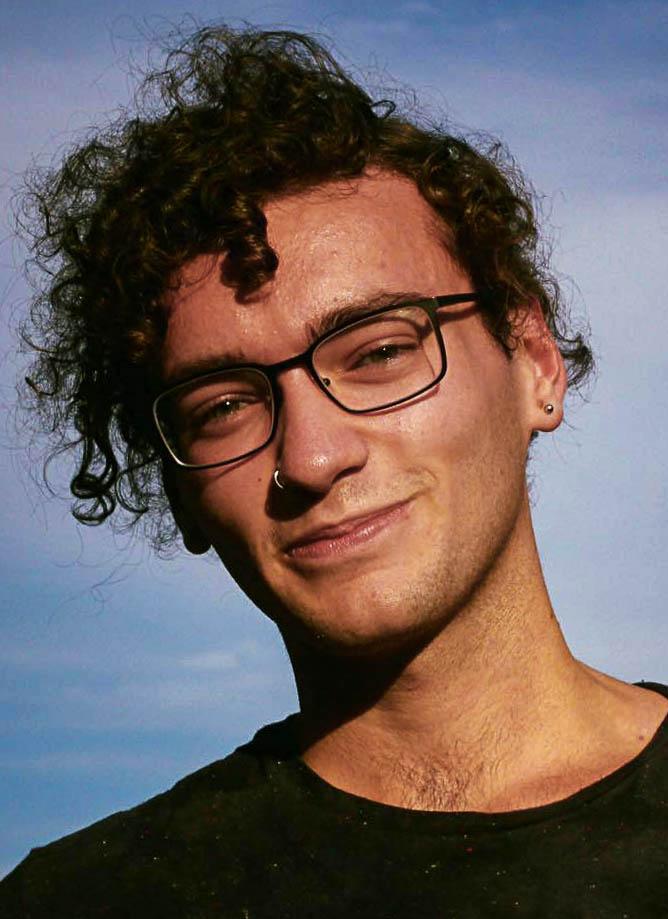The Barry Goldwater Scholarship and Excellence in Education Foundation is a prestigious scholarship that works to encourage outstanding students to pursue careers in mathematics, the natural sciences and engineering. This year, two Grinnell College students — Rachel Bass and Tim Burnette, both ’19 — have received Honorable Mention in the award.
Over 420 colleges and universities nominated 1,280 students for the scholarship this year, 211 students receiving the scholarship and 281 an Honorable Mention.
Bass is a physics and mathematics double major and was initially introduced to the Goldwater Scholarship last year by her advisor. The application process was extensive and required a lot of work, she said.
“I think I went through eight drafts of my essay,” Bass laughed. “It was a lot of revision and trying to fine tune things and it was kind of an exhausting process but I think it really helped me writing applications for summer programs and become aware of things that I was just oblivious to.”
For Bass’s application, she wrote her essay about her past research and how she plans to build upon either that research, or new work in her future career as a scientist. Last summer, Bass did research at Cornell College, where she modeled dipole magnets as they went into an accelerator.
“I talked about that modeling process and the contributions I made to the project and future stuff where I am interested in accelerator science and particle physics experiments. … I talked about past research, what I had done, and what I’d want to do building upon that in the future,” Bass said.
Currently, Bass is a mentor for physics and works in the math lab. Bass plans to pursue a Ph.D. in experimental particle physics. She would like to possibly combine her interest in mentorship with her academic interests.
“I enjoy that mentoring, tutoring relationship. Being a professor would be cool or even if I was a researcher and having some say into outreach,” she added.
Bass will be spending her summer at an accelerator facility in Geneva, Switzerland to learn more about her interest in this area of physics. “Hopefully I’ll get to see a more experimental instead of engineering side of it,” she added.
Burnette is a biology major. They first heard about the scholarship during former CLS advisor Dr. Steve Gump’s annual potato luncheon for second years.
Like Bass, Burnette felt that the application process was intensive.
“The process is intensive and truly makes you examine yourself and your academic interests. You have to really know yourself to present a cohesive application. In a way, I felt as if I was condensing my whole life down into those few essays and responses and it was so hard to do,” Burnette wrote in an email to The S&B.
Burnette wrote their application essay about their MAP research from last summer where they studied the growing drought tolerance in the Clarkia species in environments with growing global drought and changes in water availability.
Burnette plans to continue their research with the Clarkia species in the fall of 2018. Additionally, they will spend their summer at the University of Colorado at Boulder to study the drought tolerance of xeric tallgrass prairies in Colorado.
Burnette plans to continue studying drought tolerance and to apply for the Churchill Scholarship and Fulbright. Additionally, Burnette wants to teach at the university level and they believe “this process only confirmed that, but it also showed me how interested I am in drought tolerance in natural plant communities,” they wrote.
For Burnette, it is a tangible confirmation that they are capable of conducting this work and that they deserve to be where they are.
“Being gay, non-binary, first-generation and low-income in science can be alienating from my peers and the scientific community. I always feel as if I need to work more to catch up and that can be stressful. But, receiving this award [has] definitely made me feel like my work wasn’t in vain. It made me feel so good to have my efforts recognized at a national level and built my confidence a little bit more,” Burnette wrote.


















































